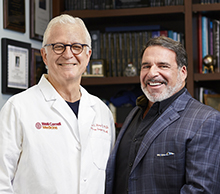The Board of Overseers of Weill Cornell Medicine have appointed Neurosurgeon-in-Chief Philip E. Stieg, PhD, MD, as the first Margaret and Robert J. Hariri, MD ’87, PhD ’87 Professor of Neurological Surgery. The endowed fellowship was made possible through a $3 million gift from Dr. Robert Hariri (MD ’87, PhD ’87) and his wife, Margaret. The endowment will support continued groundbreaking research in the Department of Neurological Surgery at Weill Cornell Medicine.
In announcing the appointment, Augustine Choi, MD, the Stephen and Suzanne Weill Dean of Weill Cornell Medical College, said that the new role was awarded in recognition of Dr. Stieg’s “international reputation as a neurosurgeon, particularly in cerebrovascular disorders and skull base surgery” along with his “outstanding research, teaching, mentoring, and publications.”
Dr. Hariri earned his degrees at the Tri-Institutional MD-PhD Program at Weill Cornell before joining the faculty of the Department of Neurological Surgery, where he forged a lifelong friendship with and admiration for Dr. Stieg. Dr. Hariri went on to create a neurosurgical device company, then became an innovator in the new field of regenerative medicine. He founded and led Celgene Cellular Therapeutics and Human Longevity before founding his current company, Celularity, which develops cellular therapies developed from placental stem cells.
“Phil is a brilliant surgeon and scientist and he’s also a very innovative thinker,” said Dr. Hariri in an interview for the Weill Cornell Medicine publication Milestones. “He is committed to changing the way neurological diseases are treated, and he’s open to new technologies and tools, such as cell therapy and regenerative medicine. With this gift, I saw a rich opportunity to do something meaningful for Weill Cornell and open new opportunities for collaboration between academic and industry scientists.”
Dr. Stieg is known worldwide for his expertise in neurosurgery and for his commitment to training the next generation of physicians and researchers. He has a special interest in educating the public about the importance of overall brain health as well as in developing new approaches to neurosurgery, including regenerative medicine.
“The trend over the last two decades has been toward minimal-access approaches to neurological surgery,” says Dr. Stieg. “The smallest of tools and incisions make it possible to repair disorders of the brain and spine with minimal disruption. The frontier now is making those repairs with no incision at all – we are using new technologies like focused ultrasound to cure a number of conditions, and we are investigating immunotherapy and gene therapy for others. Regenerative medicine is such an exciting opportunity, and I’m grateful for Dr. Hariri’s support to help us explore its uses in neurosurgical patients.”


